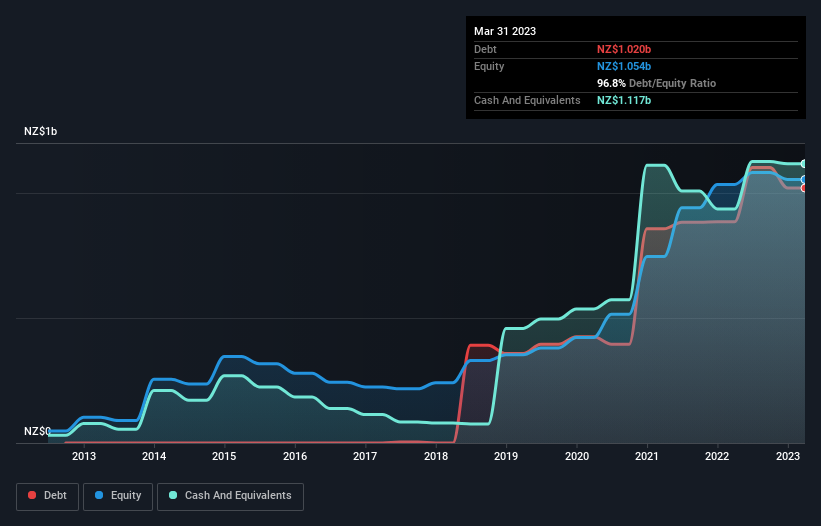
Legendary fund manager Li Lu (who Charlie Munger backed) once said, 'The biggest investment risk is not the volatility of prices, but whether you will suffer a permanent loss of capital.' So it might be obvious that you need to consider debt, when you think about how risky any given stock is, because too much debt can sink a company. We can see that Xero Limited (ASX:XRO) does use debt in its business. But the more important question is: how much risk is that debt creating?
When Is Debt Dangerous?
Debt assists a business until the business has trouble paying it off, either with new capital or with free cash flow. Part and parcel of capitalism is the process of 'creative destruction' where failed businesses are mercilessly liquidated by their bankers. While that is not too common, we often do see indebted companies permanently diluting shareholders because lenders force them to raise capital at a distressed price. Of course, plenty of companies use debt to fund growth, without any negative consequences. The first step when considering a company's debt levels is to consider its cash and debt together.
View our latest analysis for Xero
How Much Debt Does Xero Carry?
You can click the graphic below for the historical numbers, but it shows that as of March 2023 Xero had NZ$1.02b of debt, an increase on NZ$884.8m, over one year. But on the other hand it also has NZ$1.12b in cash, leading to a NZ$97.4m net cash position.

How Strong Is Xero's Balance Sheet?
Zooming in on the latest balance sheet data, we can see that Xero had liabilities of NZ$255.1m due within 12 months and liabilities of NZ$1.18b due beyond that. On the other hand, it had cash of NZ$1.12b and NZ$69.5m worth of receivables due within a year. So its liabilities total NZ$249.5m more than the combination of its cash and short-term receivables.
This state of affairs indicates that Xero's balance sheet looks quite solid, as its total liabilities are just about equal to its liquid assets. So while it's hard to imagine that the NZ$19.9b company is struggling for cash, we still think it's worth monitoring its balance sheet. While it does have liabilities worth noting, Xero also has more cash than debt, so we're pretty confident it can manage its debt safely.
Better yet, Xero grew its EBIT by 159% last year, which is an impressive improvement. If maintained that growth will make the debt even more manageable in the years ahead. There's no doubt that we learn most about debt from the balance sheet. But ultimately the future profitability of the business will decide if Xero can strengthen its balance sheet over time. So if you want to see what the professionals think, you might find this free report on analyst profit forecasts to be interesting.
Finally, a business needs free cash flow to pay off debt; accounting profits just don't cut it. While Xero has net cash on its balance sheet, it's still worth taking a look at its ability to convert earnings before interest and tax (EBIT) to free cash flow, to help us understand how quickly it is building (or eroding) that cash balance. During the last three years, Xero generated free cash flow amounting to a very robust 81% of its EBIT, more than we'd expect. That puts it in a very strong position to pay down debt.
Summing Up
While it is always sensible to look at a company's total liabilities, it is very reassuring that Xero has NZ$97.4m in net cash. The cherry on top was that in converted 81% of that EBIT to free cash flow, bringing in NZ$105m. So we don't think Xero's use of debt is risky. While Xero didn't make a statutory profit in the last year, its positive EBIT suggests that profitability might not be far away. Click here to see if its earnings are heading in the right direction, over the medium term.
When all is said and done, sometimes its easier to focus on companies that don't even need debt. Readers can access a list of growth stocks with zero net debt 100% free, right now.
New: AI Stock Screener & Alerts
Our new AI Stock Screener scans the market every day to uncover opportunities.
• Dividend Powerhouses (3%+ Yield)
• Undervalued Small Caps with Insider Buying
• High growth Tech and AI Companies
Or build your own from over 50 metrics.
Have feedback on this article? Concerned about the content? Get in touch with us directly. Alternatively, email editorial-team (at) simplywallst.com.
This article by Simply Wall St is general in nature. We provide commentary based on historical data and analyst forecasts only using an unbiased methodology and our articles are not intended to be financial advice. It does not constitute a recommendation to buy or sell any stock, and does not take account of your objectives, or your financial situation. We aim to bring you long-term focused analysis driven by fundamental data. Note that our analysis may not factor in the latest price-sensitive company announcements or qualitative material. Simply Wall St has no position in any stocks mentioned.
About ASX:XRO
Xero
A software as a service company, provides online business solutions for small businesses and their advisors in Australia, New Zealand, and internationally.
Flawless balance sheet with reasonable growth potential.


